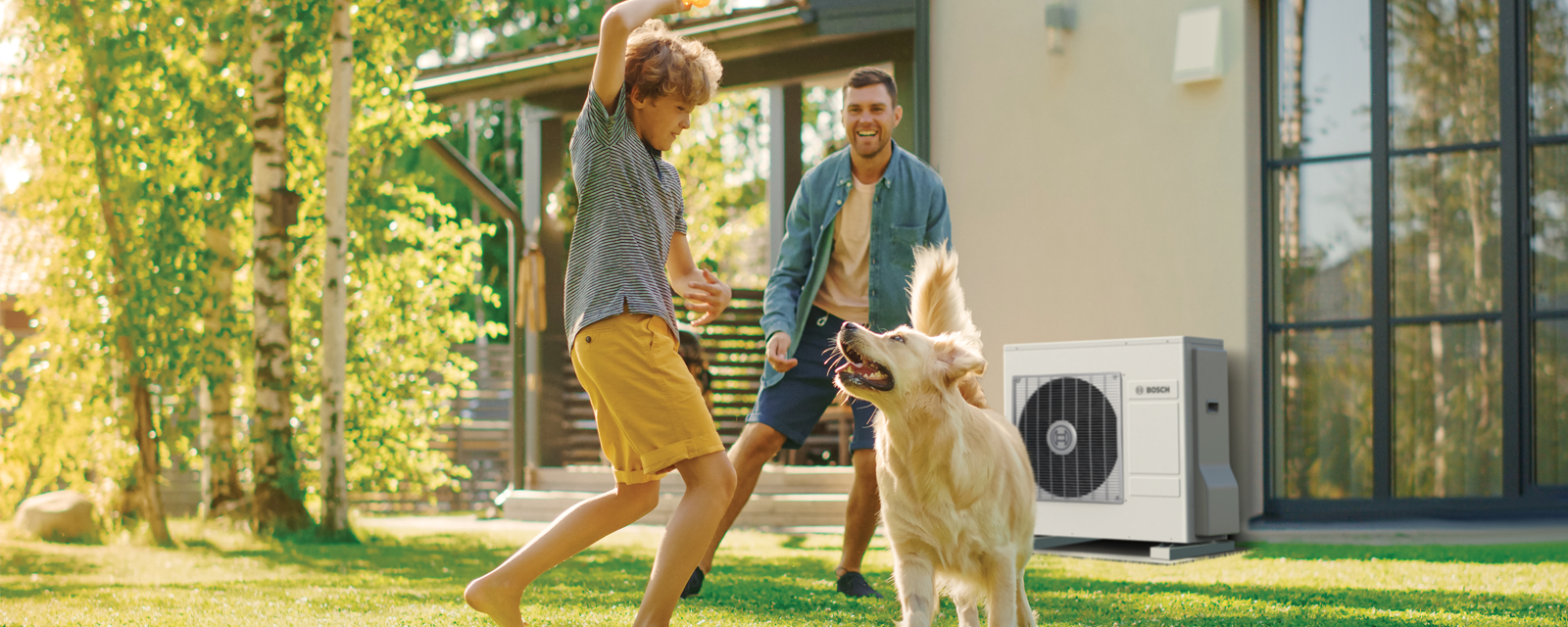
Heat pump: The new heating system for your home?
You are interested in a heat pump, but you are not yet familiar with the topic? Then you've come to the right place! Our complete overview of heat pumps provides you with answers to the most important questions and guides you step by step through all relevant aspects - with a high level of practical relevance and clearly explained using graphics, application examples, videos, tools and comparisons. Will your next heating system be a heat pump? Find out, with Bosch!
Table of content
- For quick readers: the most important facts about heat pumps at a glance
- What is a heat pump?
- What is the cost of a heat pump? Costs for purchase and electricity consumption
- Advantages and disadvantages of a heat pump
- Interim conclusion: When is a heat pump really worthwhile? Prerequisites for high efficiency
- Function of a heat pump
- The types of heat pump in comparison: Which is the best heat pump for your property?
- How loud is a heat pump? Test the volume now with the Sound Tool for heat pumps from Bosch.
- Combining a heat pump with photovoltaics
- Heat pumps from Bosch
- FAQ about heating with a heat pump
For quick readers: the most important facts about heat pumps at a glance
- A heat pump heats, produces hot water and cools homes with free environmental energy without the use of fossil fuels.
- Heat pumps are ideal for new buildings; existing buildings must be in good energy condition.
- A heat pump for a single-family home costs around 10,000 to 25,000 euros.
- The necessary operating electricity costs up to 1,000 euros a year and can be significantly reduced with a dedicated photovoltaic system.
- High state subsidies of up to 45% when replacing an old heating system.
- The cost-effectiveness of a heat pump depends on its efficiency, measurable as annual performance factor and COP value.
- Heat pumps work like a refrigerator, only in reverse by means of evaporation, compression, condensation and expansion of a refrigerant.
- There are three main types of heat pump: air-source, ground-source and groundwater heat pumps, each with its own advantages and disadvantages.
- You can easily test the appearance and sound of the popular air-to-water heat pump with the Bosch 3D and Sound Tool.
- Take advantage of the consulting and quotation service, as well as rental and financing models for a wide selection of modern Bosch heat pumps.
What is a heat pump?
A heat pump is, in a sense, "the heating system of the moment" and for many single-family homes the heating system with the greatest potential for the future. Why? The heat pump is an environmentally friendly heating system that can be used to heat, provide hot water, and even cool your home all year round.
Simply explained, a heat pump uses free energy from the environment for heating - from the ambient air, the ground or groundwater - and is therefore independent of fossil fuels such as natural gas or heating oil. Only electricity is required to operate the heat pump. The heat pump uses the operating current extremely efficiently and obtains three to four kilowatt hours of additional heat from the immediate surroundings of your house with one kilowatt hour of electricity. If you can use green electricity or solar power from your own photovoltaic system for the operating current, you can heat with a heat pump completely CO2-free and largely self-sufficient.
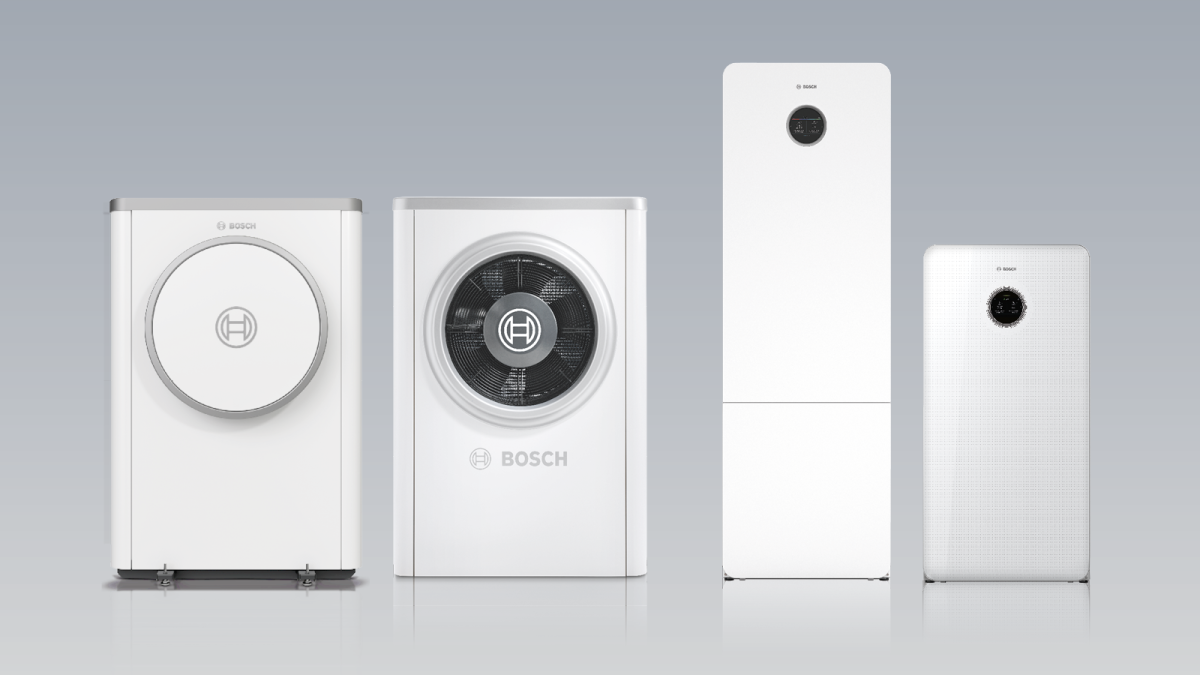
This makes heat pumps indispensable for the success of the energy transition and puts them in the spotlight as an important component in the fight against climate change. Today, heat pumps are already recording significant growth in installation figures from year to year and have now replaced gas heating as the most popular heating system for new buildings. With the right planning, however, the heat pump is also an alternative to gas and oil for many existing buildings, thanks in part to the high level of government subsidies.
Experts agree that the heat pump will be one of the most economical heating systems for a single-family home in the near future. The reasons for this are the increase in the price of fossil fuels due to rising gas, oil and CO2 prices, as well as falling investment costs for heat pumps and solar technology.
What is the cost of a heat pump? Costs for purchase and electricity consumption
We would like to briefly answer the two most frequently asked questions on the subject here: "What does a heat pump for a single-family home cost?" and "How much electricity does a heat pump consume?". Depending on the heat source, the cost of a heat pump in a single-family house is around 10,000 to 25,000 euros without subsidies. The consumption of a heat pump is up to 5,000 kilowatt hours per year, which accounts for electricity costs of up to about 1,000 euros. Added to this are manageable maintenance costs.
-
Air source heat pump
Acquisition costs 10.500–17.500 Euro Installation costs 4.500–5.500 Euro Development costs none Total price 15.000–23.000 Euro Cost per year** ca. 1.110 Euro -
Geothermal heat pump
Acquisition costs 12.000–14.000 Euro Installation costs 3.500–4.500 Euro Development costs 3.500-5.500 Euro for collector installation*
9.500-11.500 for deep drilling*Total price 15.000-23.000 Euro
19.000-24.000 Euro with ground collectors
25.000-30.000 with earth probesCost per year** ca. 900 Euro -
Groundwater heat pump
Acquisition costs 11.000–14.000 Euro Installation costs 3.500–4.500 Euro Development costs 5.500-8.500 Euro for well drilling Total price 20.000–27.000 Euro Cost per year** ca. 800 Euro
* For boreholes, the cost is 50 to 60 euros per meter drilled; for collector installation, the cost is approximately 40 to 50 euros per meter buried. ** The consumption costs are an average value. Basis is a typical single-family house with 120 m² living space, total heat demand 20,000 kWh per year, electricity price for the heat pump 20 cents / kWh.
If a heat pump is to be combined with photovoltaics, the additional costs amount to approx. 10,000 euros. Read our advice articles on gas heating alternatives and oil heating alternatives to find out what costs arise when you convert a gas heating system or oil heating system to a heat pump.
Request an offer without obligation! >
Advantages and disadvantages of a heat pump
Advantages of a heat pump
- Environmentally and climate friendly, as heating is provided without fossil fuels
- Environmental heat is available free of charge and only needs to be tapped
- Completely CO2-free with green electricity or own solar power
- High independence, only dependent on operating power
- High state subsidies
- Can also cool in summer and saves the purchase of an additional air conditioning system
- Ideal heating system with existing photovoltaic system
- Easy operation on the device, via remote control or app
- Smart home capable
- Low maintenance with low maintenance costs
Disadvantages of a heat pump
- Sensitive heating system that must be individually adapted to a building
- Comparatively high investment costs and high planning effort
- Additional development costs and earthworks for an earth or groundwater heat pump
- For retrofitting in old buildings, a good building fabric is a prerequisite
- Radiators often need to be refurbished before installation
- Backup system may be required for particularly cold days (electric heater)
- Increased electricity costs with incorrect planning
- Electricity prices for heat pump power are not exempt from general price increases
- Photovoltaic system for own power supply costs additionally
- Air-source heat pumps can be acoustically disturbing if they are not soundproofed.
Interim conclusion: When is a heat pump really worthwhile? Prerequisites for high efficiency
Unlike pellet or gas heating, a heat pump is a sensitive heating system. The technology has fewer reserves if more heating power is unexpectedly required, for which the heat pump was not originally designed. Whether heating with environmental heat is worthwhile is closely related to the efficiency of a heat pump. If the right conditions are met, as in the case of a new building or energy-efficient old building, the heat pump heats very efficiently and enables permanently low operating costs.
From a technical point of view, the efficiency of a heat pump is related to the following parameters:
The flow temperature for the heating surfaces is central to finding out whether a heat pump is suitable for your house. A constant 35 °C in the flow is ideal. This requires good insulation and high-quality surface heating, such as wall or floor heating. If the flow temperature is much higher than 45 °C, the efficiency of the heat pump drops and energy costs rise.
The "Coefficient of Performance" stands for the performance of a heat pump under laboratory conditions and can often be found in product documentation. A heat pump with a COP value of 3.1 to 5.1 is considered efficient and economical. If the value is shown as SCOP, the informative value is even higher, since seasonal changes in heating demand are also included.
In contrast to the COP, the annual performance factor (APF) stands for the efficiency of a heat pump in real operation. The higher the COP, the more efficiently the heat pump operates. Air-source heat pumps achieve an COP of up to approx. 3.5; ground-source heat pumps up to approx. 4.5 and groundwater heat pumps up to approx. 5.0. With an annual performance factor of 4.0, the unit provides the heat required for heating and hot water from one part electricity and three parts environmental energy.
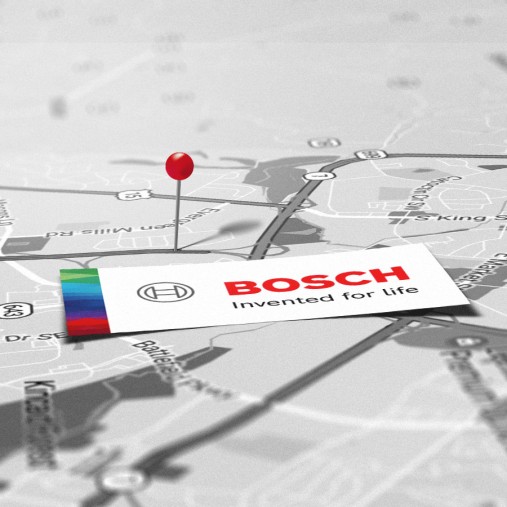
Bosch - Your strong partner for heat pumps
- Outstanding innovative strength
- High quality and safety standards
- 5-year system warranty
- Over 100 years of expertise in thermotechnology
- Attractive subsidy opportunities
- Bosch is your smart partner for environmentally friendly and efficient heating systems.
Function of a heat pump
Heat pumps take energy from ambient air, soil or groundwater and use it to heat your living spaces. The structure of a heat pump is composed of the heat source, the heat pump and the system that distributes and stores the heat in the house. The operation of a heat pump is similar to the principle of a refrigerator, only in reverse. While the refrigerator extracts the heat from its interior and releases it to the outside, the heat pump extracts the heat from the outside and transports it into the house as heating energy. Here's how it works: In the closed heat pump circuit, thermal energy from the environment is transferred to a refrigerant and converted into useful heat by means of evaporation, compression, liquefaction and expansion, which is transported into the living spaces via the heating system. The heat pump only needs electricity to do this. A heat pump can provide heating and hot water and is characterized by high efficiency in its mode of operation.
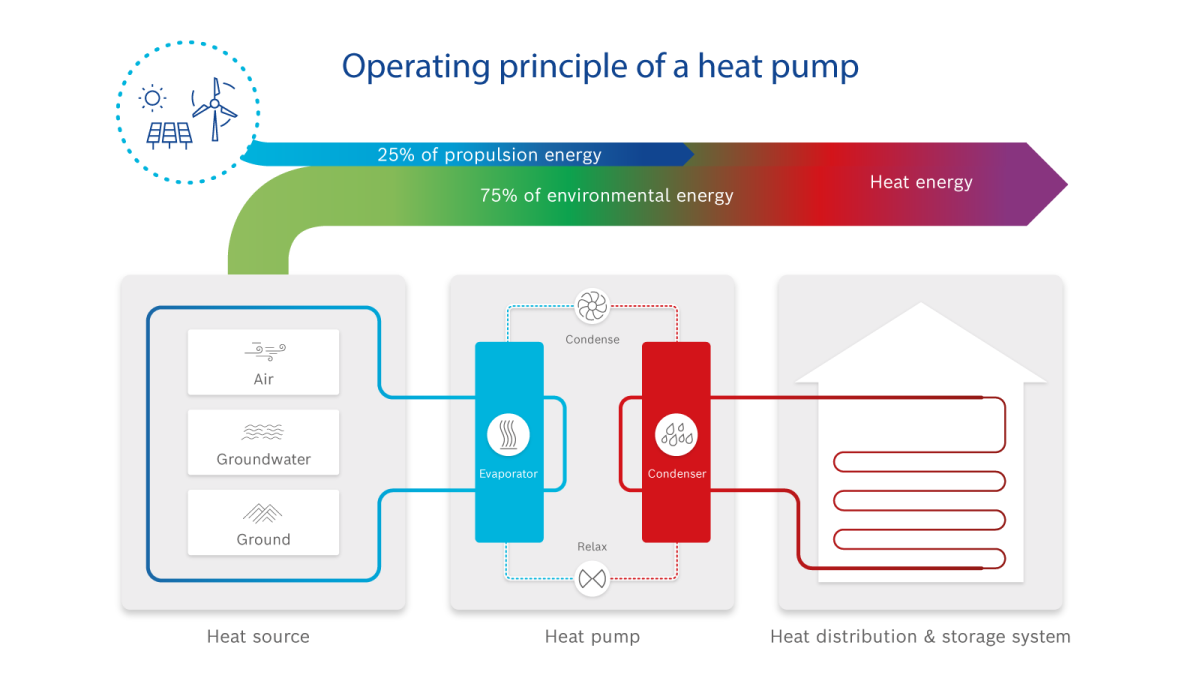
The types of heat pump in comparison: Which is the best heat pump for your property?
The heat pump basically comes in three types: air-to-water, brine-to-water and water-to-water. Air-to-water heat pumps are by far the most sought-after devices here, as they are the easiest to install. With air-to-air and domestic hot water heat pumps, there are other "special forms" that are used for special purposes. With the following comparison, we want to give you a first impression of which heat pump is possibly the best for your house. You can also find more information in our advice article on heat pump comparison.
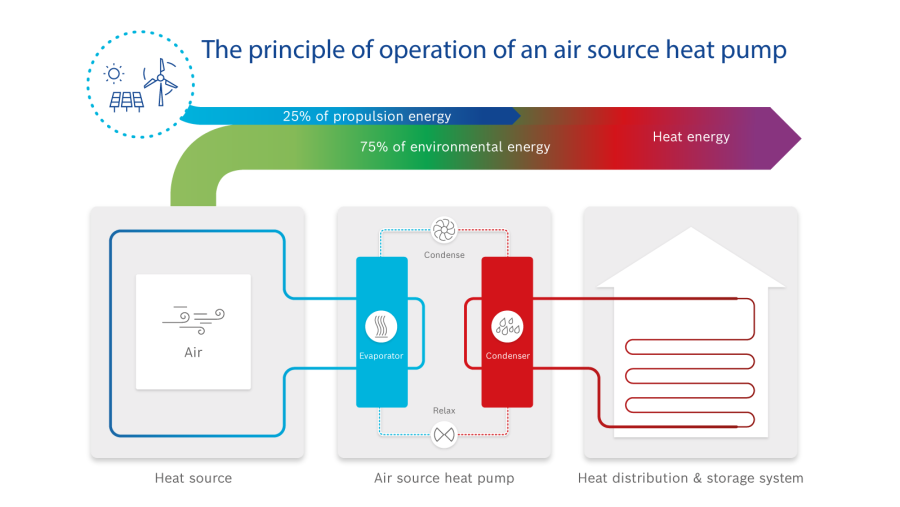
Air-to-water heat pumps
Heat source: Outside air
Uses: Heating, hot water, cooling in old and new buildings.
Advantages: No or minimal land area required; outdoor or indoor installation possible; minimal construction required without earthwork; permit-free; less expensive than other heat pumps; can be hybridized with solar, gas or oil
Disadvantages: Efficiency/annual performance factor somewhat lower compared to other heat pumps; only heat pump where outdoor noise is relevant
More information: Guide article on air-to-water heat pumps.
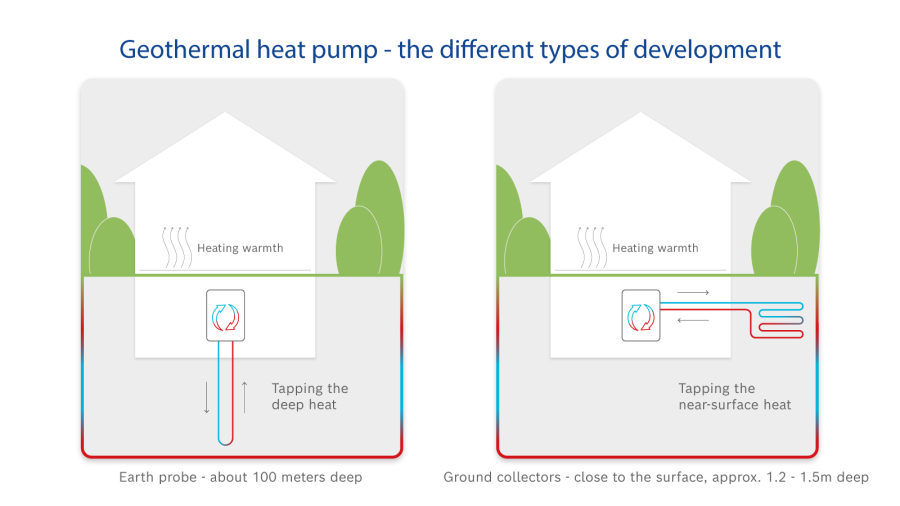
Brine-water heat pumps
Heat source: ground (near-surface geothermal with large-scale ground collectors up to 2 m deep or deep geothermal with ground probes up to 100 m deep).
Use: Heating, hot water, cooling in old and new buildings.
Advantages: High efficiency year-round due to constant ground temperatures; independent of air temperatures; no visible outdoor equipment; low operating costs; hybrid with solar
Disadvantages: Compared to other heat pumps, higher initial costs and high construction costs due to earthwork or deep drilling; medium-size lot required; permit required
Further information: Advice article on brine-to-water heat pumps.
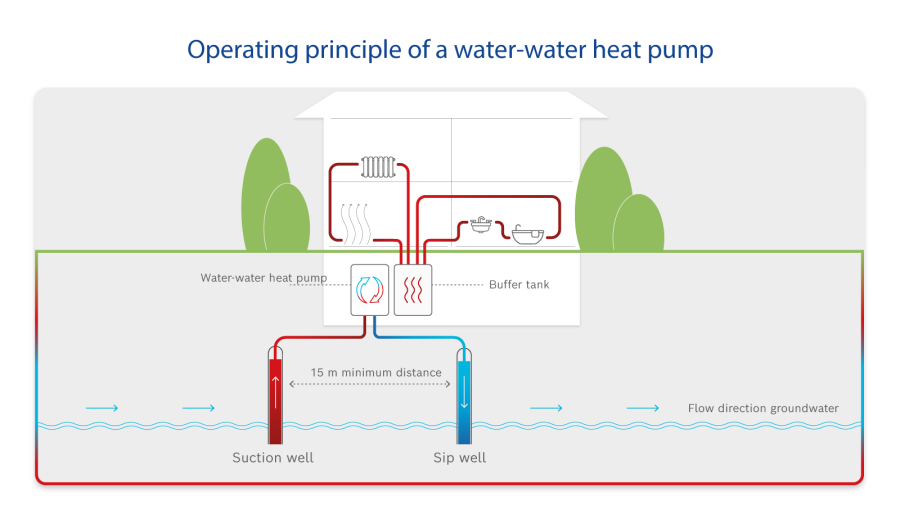
Water-water heat pumps
Heat source: ground (near-surface geothermal with large-scale ground collectors up to 2 m deep or deep geothermal with ground probes up to 100 m deep).
Use: Heating, hot water, cooling in old and new buildings.
Advantages: High efficiency year-round due to constant ground temperatures; independent of air temperatures; no visible outdoor equipment; low operating costs; hybrid with solar
Disadvantages: Compared to other heat pumps, higher initial costs and high construction costs due to earthwork or deep drilling; medium-size lot required; permit required
Further information: Advice article on brine-to-water heat pumps.
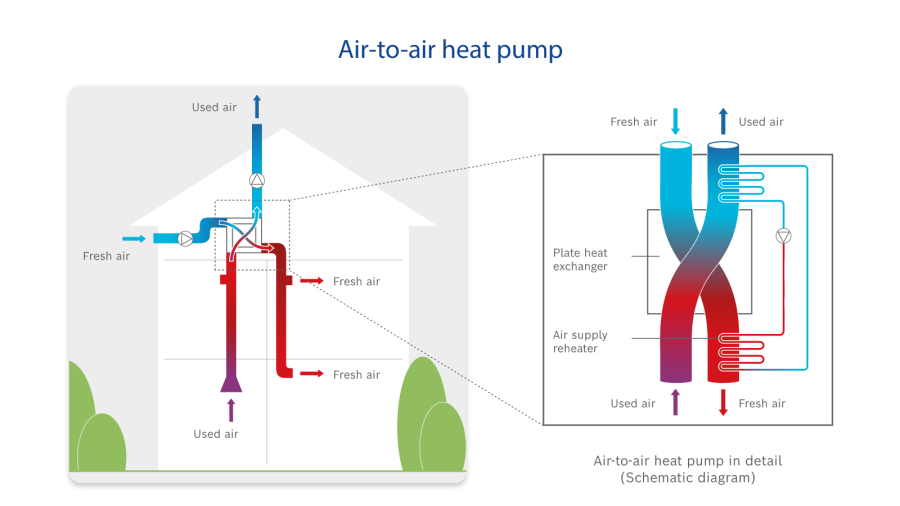
Air-to-air heat pumps
Heat source: exhaust air from indoor spaces
Application: Heat recovery for ventilation systems / air heaters of low-energy and passive houses (new construction).
Advantages: Ideal supplement for ventilation systems for space heating; air conditioning possible; can be combined with photovoltaics
Disadvantages: Only relevant for ventilation heating systems in high-efficiency new buildings; unsuitable for old buildings; no water heating; less efficient than other heat pumps; higher maintenance requirements
More information: Advice article on air-to-air heat pumps.
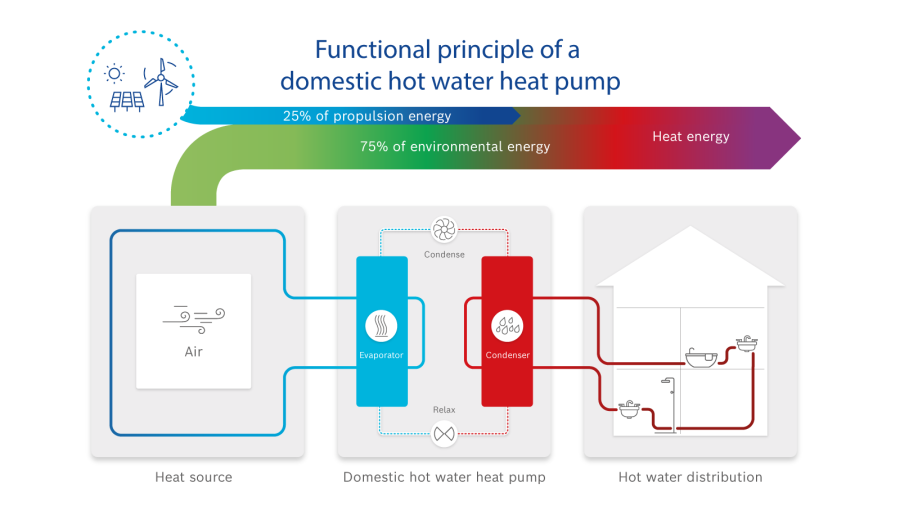
Domestic hot water heat pumps
Heat source: waste heat from technical equipment indoors (indoor air).
Use: Hot water in old and new buildings
Advantages: Taps unused, cost-free waste heat for water heating; low initial cost; easy installation; high efficiency; small footprint; can be combined with almost all heating systems
Disadvantages: Unsuitable for residential heating and air conditioning; waste heat in boiler room, server room, etc., must be constant year-round
Further information: Guide article on domestic hot water heat pumps.
How loud is a heat pump? Test the volume now with the Sound Tool for heat pumps from Bosch.
Supposed noise in the outdoor area of residential buildings is an issue with heat pumps. However, only air-to-water heat pumps are affected. The devices draw in ambient air with the help of a fan, which causes perceptible operating noise. Ground-source and groundwater heat pumps, on the other hand, operate completely silently outdoors.
In order to assess the loudness of an air-to-water heat pump, it is important to distinguish between sound power level (noise generated directly by the heat pump) and sound pressure level (perceptible noise at a normal distance). Bosch sound-optimized heat pumps achieve peak sound pressure levels of less than 40 decibels (like rustling leaves) and can be used in tightly built-up residential areas.
You can use the Bosch sound tool to test the sound levels of our current air-to-water heat pumps. For more information, such as the appropriate installation location and distances to neighboring properties, see our guide article on heat pump sound levels.
Combining a heat pump with photovoltaics
Photovoltaics is an ideal complement for a heat pump in a single-family home. You can generate most of the electricity required for the heat pump yourself with the photovoltaic system, which minimizes electricity costs in the long term and makes you less dependent on energy suppliers and rising electricity prices. In addition, the solar power can also be used in the household.
Optimal interaction between solar and heat pump is ensured by an electricity storage system and the intelligent distribution of solar power in the house. In a hybrid heat pump from Bosch, this task is performed by the Bosch Energy Manager. The smart tool regulates all power flows in the house fully automatically and optimally adapts the operating times of the heat pump to the availability of self-produced electricity. This saves a lot of electricity from the grid and significantly increases your independence.
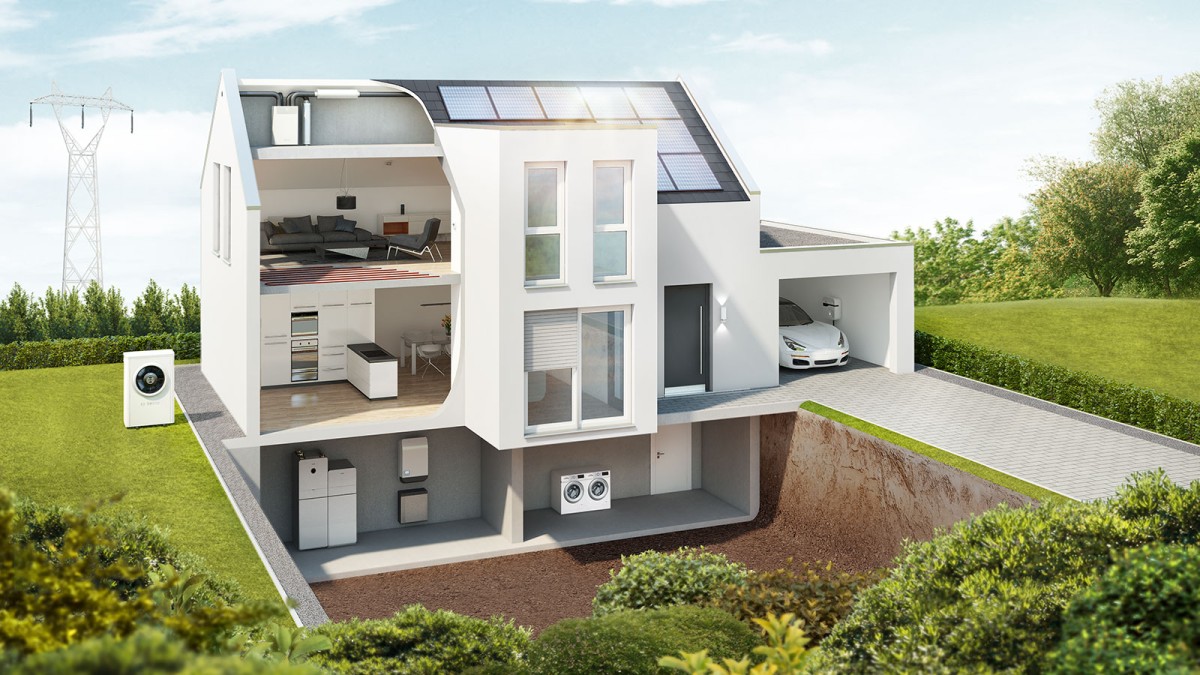
Heat pumps from Bosch
At Bosch, you'll find a wide selection of innovative heat pumps for single-family homes as well as duplexes and apartment buildings. Our product range includes air-to-water heat pumps, brine-to-water heat pumps, and domestic hot water heat pumps. With a Bosch heat pump, you can easily supply your home with heat and hot water and benefit from the high quality and reliability of our products.
-
High-efficiency heat pump technology that saves on heating costs
-
Whisper-quiet air-source heat pumps through consistent sound optimization
-
The right heat pump for every output: air-source heat pumps from 2-56 kW, ground-source heat pumps from 2-78 kW
-
Hybrid capable with solar, gas or oil
-
Innovative use of solar power with the Bosch Energy Manager
-
Easy operation via color touch display, remote control or app
-
Easy integration of the heat pump into a smart home system
-
Attractive design
-
5 years warranty
FAQ about heating with a heat pump
How long does a heat pump last?
My house has radiators. Does it still make sense to install a heat pump?
What is the EVU interruption for a heat pump all about?
Heat pump or condensing technology: Which is more economical?
Does a heat pump with photovoltaics receive additional government funding?
How often is maintenance necessary for a heat pump and what are the maintenance costs?